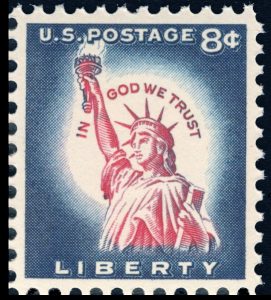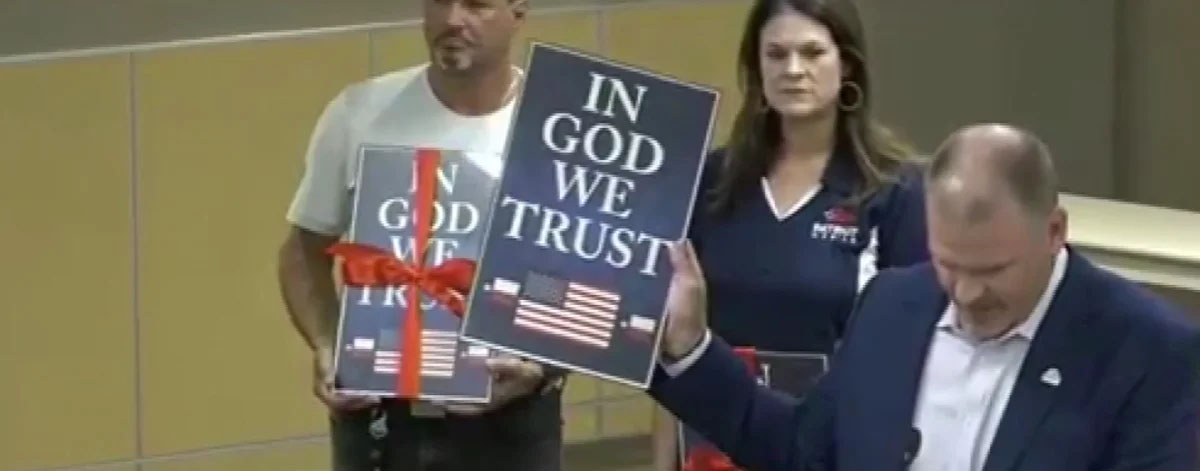As schoolchildren head back to class in Texas this week, many of them will be greeted by the sight of the American and Texas flags displayed along with the text of the National Motto: “In God We Trust.”
That’s because last year the Texas Legislature passed a little-noticed bill that requires any elementary or secondary school or institution of higher education to “display in a conspicuous place in each building of the school or institution a durable poster or framed copy of the United States National Motto.”

Members of the Yellow Rose of Texas Republican Women deliver posters to a Texas school in August 2022.
That piece of legislation came amid a more well-publicized flurry of bills to address how American history, race, gender and sexuality are taught in Texas classrooms.
Texas — which has the largest number of students in a state controlled by conservative Republicans — joins more than a dozen states with varying laws encouraging or requiring display of the National Motto in schools.
For example, in South Dakota, a 2019 state law mandates that public schools install displays with the national motto that are no less than 12 inches by 12 inches and are located in a prominent location such as an entryway, lobby or cafeteria.
If presented with plaques featuring the national motto, Texas schools must display them prominently.
The Texas law mandates such displays only if outside groups fund them. In other words, if presented with plaques featuring the national motto, Texas schools must display them prominently.
The only stipulations are that the posters or plaques or other visuals must include the American flag and the Texas flag and “may not depict any words, images or other information” beyond the motto.
Outside groups of conservative evangelicals — the very people who advanced the state legislation — are more than eager to fund the displays. One such group is a Texas-based wireless provider Patriot Mobile. The company’s related political action committee, Patriot Mobile Action, has bankrolled conservative candidates in North Texas school board races. This is part of statewide and national efforts to gain control of school boards and promote conservative evangelical causes.
Eager to fund the posters
On Monday, Aug. 15, Patriot Mobile showed up at the Carroll Independent School District board meeting to present framed posters with the national motto printed in all caps above the American flag.
“Patriot Mobile is here today to donate these beautiful ‘In God We Trust’ framed posters for each school,” Scott Coburn, chief marketing officer for the company, said, according to a report in the Dallas Morning News.

Showing off the “In God We Trust” posters at the Carroll ISD board meeting Aug. 15.
Carroll Independent School District is based in the affluent Fort Worth suburb of Southlake, which has been at the center of disputes over Critical Race Theory, gender, sexuality and library books — all the touchstones of conservative parents stirred to action by a national campaign designed to appear driven by grassroots families.
Last year, the school district made national headlines when an administrator advised teachers to present “opposing” perspectives on the Holocaust.
News of the poster donations drew protests before the meeting, but at least one parent spoke at the school board meeting to commend the posters, according to the Morning News.
“There’s a lot of criticism out there of course going on in social media,” Kelly McGuire said. “I just wanted to take this opportunity to remind everybody that last year admin allowed ‘Black Lives Matter’ signs on the senior high campus for about a semester, several days a week. So I’m not sure how people can complain on one hand about these signs under Texas law, and on the other hand, allow BLM signs.”
Signs of a national battle
What’s happening in Texas in general and at Carroll schools in particular is a sign of a nationwide movement by political and theological conservatives to dominate public schools and protect their children from things they don’t want them to know. The movement largely involves white parents in school districts with increasing diversity.
“As part of their larger effort to promote the false narrative that America was founded as a Christian nation, Christian nationalists have sought to require the display of religious materials in public schools.”
Blitz Watch is a national group opposing promotion of “In God We Trust” displays in public schools. The group’s website explains: “As part of their larger effort to promote the false narrative that America was founded as a Christian nation, Christian nationalists have sought to require the display of religious materials in public schools. One of the most successful examples of these efforts is the push to pass state laws requiring that public schools display the national motto (In God We Trust). These bills undermine students’ freedom of religion by inserting one particular religious view into the classroom.”
The opposition group claims the national motto bills being passed in state legislatures are coordinated by Project Blitz, a coalition of rightwing evangelical people and groups best known for producing “model” bills spread to state legislatures to advance their views. Project Blitz previously posted its materials openly online but now has “gone underground,” according to Blitz Watch.
One of the leaders of Project Blitz is David Barton, a high-profile purveyor of revisionist American history, advancing the false notion that America was “founded as a Christian nation.”
History of national motto
Use of the phrase “In God We Trust” in American life dates to the Civil War era. A Baptist pastor in what is now Prospect Park, Pa., appealed to the Treasury Department to add a statement recognizing “Almighty God in some form on our coins” in order to “relieve us from the ignominy of heathenism.”
Mark R. Watkinson, pastor of Prospect Hill Baptist Church, appears to have been motivated by a desire to portray God on the Union side of the Civil War. The Confederacy had invoked God in their Constitution.
 The phrase first appeared on U.S coins in 1863. It did not become the national motto until 1956, during the Eisenhower administration and the beginnings of the Cold War with Russia, often portrayed by Christians as controlled by “Godless Communism.”
The phrase first appeared on U.S coins in 1863. It did not become the national motto until 1956, during the Eisenhower administration and the beginnings of the Cold War with Russia, often portrayed by Christians as controlled by “Godless Communism.”
Although considered by strict church-state separationists as a violation of the First Amendment, the phrase has been perpetually popular in national polling. But as evangelicals have sought to exert more influence on government, they have adopted the motto as a rallying cry for their cause.
Tennessee lawsuit
In Tennessee, a federal district court judge recently dismissed a case challenging that state’s law that requires schools to post the national motto “in a prominent location.”
Dustin Fader brought suit on behalf of his minor daughter, who was enrolled at a public charter school in Nashville. On the first day of school last year, the family walked their kindergarten daughter into the school and noticed a large display that included “a Tennessee state flag on a mobile flagpole and seven framed posters and postcards hung on the wall in a U-shaped pattern. The central poster states only ‘IN GOD *WE* TRUST.’ The other framed items include posters and postcards depicting artistic renderings of various Middle Tennessee-related governmental and cultural sites, including, among others, the General Jackson Showboat, the Tennessee State Capitol building, Cheekwood Botanical Gardens, the Parthenon, and Union Station.”
Fader and his wife have chosen to raise their child in a nonreligious manner and found the school’s display to advance religion over no religion — a practice historically prohibited by the Establishment Clause of the First Amendment.
The Tennessee law at the heart of this legal challenge was advanced by conservative Christians who have pressed courts nationwide to favor the Free Exercise Clause of the First Amendment over the Establishment Clause. They are interested in government allowing them to freely advance their religious beliefs while dismissing concerns about government favoring one religion over other religions or no religion at all.
The case was dismissed on summary judgment by U.S. District Judge Aleta Trauger, who said the state of Tennessee was protected by “sovereign immunity.” However, the judge also found no merit in the claim that the school’s display was improper.
 “The poster does not contain any overtly or covertly religious reference or symbolism,” Trauger wrote. “As set forth above, the national motto’s reference to God does not make the statement religious as opposed to secular. The entire display in which the poster of the national motto is situated itself contains no religious symbolism or references and, as such, reflects no intention on the part of the school defendants to establish or promote a religion. Even without consideration of the new plaque explaining why the national motto is posted, the display as originally viewed by the plaintiff does not have the effect of promoting a particular religion; it is not coercive; and it does not involve any excessive entanglement of a government institution and religion.”
“The poster does not contain any overtly or covertly religious reference or symbolism,” Trauger wrote. “As set forth above, the national motto’s reference to God does not make the statement religious as opposed to secular. The entire display in which the poster of the national motto is situated itself contains no religious symbolism or references and, as such, reflects no intention on the part of the school defendants to establish or promote a religion. Even without consideration of the new plaque explaining why the national motto is posted, the display as originally viewed by the plaintiff does not have the effect of promoting a particular religion; it is not coercive; and it does not involve any excessive entanglement of a government institution and religion.”
Unintended consequences
In North Texas, Carroll schools and a neighboring district began the year with ironically differing effects of efforts to keep children safe from liberalism and secularism. While in Carroll Independent School District every school got “In God We Trust” plaques, the equally conservative Keller Independent School District began the year by purging challenged books from libraries — including the Bible.
The Texas Tribune reported that Keller school officials were removing “all books that were challenged last year within the school district, including the Bible, The Bluest Eye by Toni Morrison and a graphic novel adaptation of Anne Frank’s The Diary of Young Girl.”
All forms of the Bible were among 41 titles to be removed from shelves and locked away from student access. Some of those books had been challenged last school year but cleared by a review committee, but that review process was set aside by the influence of three new school board members elected with support from a conservative evangelical advocacy group.
While those conservative parents followed a national playlist to challenge a long list of books evangelicals love to hate, other parents asserted the Bible is equally dangerous, based on the Christian parents’ standards, because of excessive violence and pornographic portrayals of sexual activity.
Related articles:
Legislating ‘In God We Trust’: using the state to do the church’s work | Opinion by Bill Leonard
If you’re paying attention to Christian nationalism, you won’t be shocked by Michael Flynn’s call for ‘one religion under God’ | Opinion by Amanda Tyler
Who’s behind the nationwide attacks on local school boards over Critical Race Theory?


